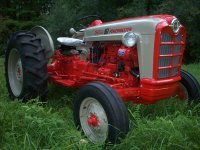motownbrowne
Elite Member
- Joined
- Dec 30, 2013
- Messages
- 2,613
- Location
- river falls, wi
- Tractor
- Kubota mx4700 HST, New Holland TC-29D
I'm a vegetable grower also. My dad farmed veggies with a Troy-bilt Horse and a Ford 8N for almost 40 years. He built a successful business with very little capital investment. When my wife and I moved back to the farm and bought the business, we bought a Kubota mx4700. I grew up on the 8n, and i wanted something better. All I can say is that a 4wd hydrostatic tractor with a loader is the best thing I can imagine for vegetable farming.
Being able to constantly, instantly, and infinitely adjust your ground speed relative to your PTO speed is invaluable for rototilling. Having a loader with forks makes moving materials and heavy produce around the farm super easy.
4 wheel tractors aren't cheap, but they do so much. They also don't really lose value. Not much anyway. If I were buying now, I'd go to my Kubota dealer and buy a hydrostatic L2501 with a loader, forks, ag tires, a tiller, and a bush hog. Out the door under $23k with 0% financing for 84 months. The Kioti ck2610 would do the job also. I bought a bigger tractor mostly for the loader capacity (for lifting logs and pallets of feed), but the next size down would actually be better for growing veggies in most cases.
2 wheel tractors are great, don't get me wrong. I'd love to have a nice BCS or Grillo, but they're expensive. They're also loud. Our Troy bilt is just about the loudest machine on the farm. No way I'd want to tackle bush hogging pastures with a 2 wheeler. I'm sure it can be done, but I'd much rather have a seat and a steering wheel. Add a sun shade and a cup holder and now it's relaxing instead of a chore. That's my two cents. If you would like to chat more about veggie growing or the equipment we use on our operation, I'd be happy to chat. Shoot me a PM and I'll send you my phone number.
Being able to constantly, instantly, and infinitely adjust your ground speed relative to your PTO speed is invaluable for rototilling. Having a loader with forks makes moving materials and heavy produce around the farm super easy.
4 wheel tractors aren't cheap, but they do so much. They also don't really lose value. Not much anyway. If I were buying now, I'd go to my Kubota dealer and buy a hydrostatic L2501 with a loader, forks, ag tires, a tiller, and a bush hog. Out the door under $23k with 0% financing for 84 months. The Kioti ck2610 would do the job also. I bought a bigger tractor mostly for the loader capacity (for lifting logs and pallets of feed), but the next size down would actually be better for growing veggies in most cases.
2 wheel tractors are great, don't get me wrong. I'd love to have a nice BCS or Grillo, but they're expensive. They're also loud. Our Troy bilt is just about the loudest machine on the farm. No way I'd want to tackle bush hogging pastures with a 2 wheeler. I'm sure it can be done, but I'd much rather have a seat and a steering wheel. Add a sun shade and a cup holder and now it's relaxing instead of a chore. That's my two cents. If you would like to chat more about veggie growing or the equipment we use on our operation, I'd be happy to chat. Shoot me a PM and I'll send you my phone number.




